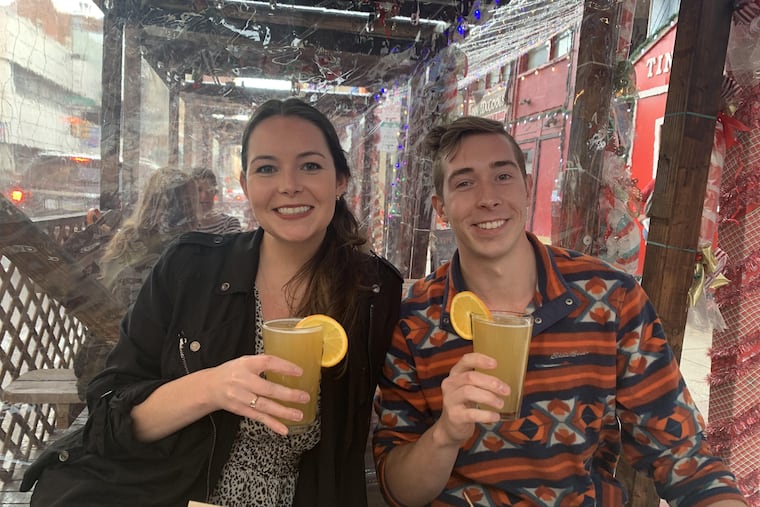A 21-year-old was found guilty of murder for fatally shooting a man walking his dog in Brewerytown
Josephus Davis faces a life sentence after being convicted of second-degree murder and related charges in the killing of Milan Loncar, 25.

A Philadelphia jury on Friday found a 21-year-old guilty of murder for fatally shooting a man who was walking his dog in Brewerytown last year — a botched robbery attempt that attracted attention for its seemingly random and senseless nature.
Josephus Davis faces a life sentence after being convicted of second-degree murder, robbery, and related charges in the death of Milan Loncar, 25, a Wayne native and 2019 Temple University graduate who was attacked after taking a walk with his dog after work. Davis shot Loncar after trying to rifle through his pockets, prosecutors said, then ran away with a co-conspirator as Loncar lay bleeding on the street.
Relatives and supporters of both Loncar and Davis cried in the courtroom as the verdict was read, though both sides declined to comment afterward.
Assistant District Attorney Joanne Pescatore, who prosecuted the case, said she was simply happy that the Loncar family got a measure of justice.
“No family should have to go through what they’ve been through,” she said.
The killing, which happened at 31st and Jefferson Streets in January 2021, was captured on surveillance video, a key piece of evidence in Davis’ two-day trial. Though prosecutors had no eyewitnesses to the crime, Pescatore said the video showed the shooter wearing distinctive shoes and a flashy belt — the same attire Davis was wearing during an unrelated encounter with police later that night.
“You’ll never forget that belt,” Pescatore told jurors during closing statements, pointing to a mannequin bearing Davis’ clothes. “You’ll never forget those sneakers.”
Davis’ attorney, Douglas Dolfman, had sought to persuade jurors that the video was insufficient evidence to prove that Davis was the gunman. Lots of people wear attire like Davis had on that night, Dolfman said, calling the case against him wholly circumstantial. Prosecutors, he said, presented no physical evidence, cell phone records, or other information linking Davis to the killing.
“We have a lot of guessing,” Dolfman said Friday. “And guessing is doubt.”
Prosecutors had sought to convict Davis of first-degree murder, arguing he’d intentionally killed Loncar by shooting at his chest. Jurors instead voted to convict Davis of second-degree murder, a slaying that occurs in the course of another felony, such as a robbery. Both crimes carry automatic life sentences, though Davis will not be formally sentenced until August.
Loncar was shot about a block from his Brewerytown home and just a few blocks from where Davis lived. Loncar had taken his dog, Roo, a dachshund-Chihuahua mix, out for a short walk, but as he passed two men on the sidewalk, Pescatore said, they boxed him in and Davis pulled a gun.
Loncar put his hands up and tried to push the gun away as the men went through his pockets. Davis then fired a shot, Pescatore said. Loncar was struck in the chest and collapsed on the street as his attackers ran away. He was later pronounced dead at the hospital.
Later that night, Davis was stopped by police at B Street and Indiana Avenue in Kensington after officers noticed a car they believed had been stolen in a carjacking the day before. Davis and a few other men hopped out and ran, Pescatore said.
When officers caught Davis and questioned him, he was wearing the distinctive belt and shoes. That evidence led prosecutors to charge him with murder several days later. His accomplice has not been apprehended.
Davis was on probation for robbery at the time of the murder, and was awaiting trial on charges of carjacking and assaulting a jail guard. He had been released from jail two weeks before Loncar was killed, leading critics to question how District Attorney Larry Krasner’s office and the city courts handled those cases and whether different decision-making could have prevented the crime.
Pescatore said that after Davis’ arrest, police tested his clothes for ballistics evidence and found a small amount of gunshot residue on one of his jackets. Dolfman told jurors that residue was not found on Davis’ outer jacket and said it could have come from a number of different places before he encountered police in Kensington.
Dolfman noted that police had seized Davis’ cell phone but were unable to use it to track his location that night. Prosecutors said the phone was not on at the time of the crime.
Pescatore said the video was enough for jurors to see that Davis was the shooter who killed Loncar — a crime she called “awful” and “horrible.”
Loncar “didn’t bother anybody. He didn’t ask for this,” Pescatore said. “He was walking his dog.”